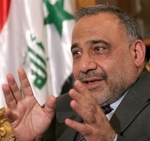Over six months after the initial election, the clearest indications yet have come that the Iraqi government is about to be formed, as top Iraqiya member Aliya Nusseif has claimed an “initial agreement” which for the first time ever has two major blocs agreeing on leadership candidates.
 The deal would have the government formed by Iraqiya, the Iraqi National Alliance (INA), and the Kurdistan Alliance. The Prime Minisitership would go to current Vice President Adel Abdulmahdi, a member of the INA and long-standing leader in the Supreme Islamic Iraqi Council (SIIC).
The deal would have the government formed by Iraqiya, the Iraqi National Alliance (INA), and the Kurdistan Alliance. The Prime Minisitership would go to current Vice President Adel Abdulmahdi, a member of the INA and long-standing leader in the Supreme Islamic Iraqi Council (SIIC).
Ayad Allawi, who led his secularist Iraqiya bloc to the largest plurality in the election despite the notable handicap of having a number of its members banned by the ruling party, is said to be tapped as the next president replacing Jalal Talabani. The Kurdistan Alliance would get the parliament chairmanship.
The INA’s road to premiership was a long and winding one, with the bloc undergoing a radical change of leadership as the SIIC lost most of its seats and the Sadrist faction gained large numbers, taking over leadership of the bloc. Though most thought an alliance between the INA and State of Law was more likely the prospect of another term for current Prime Minister Nouri al-Maliki was opposed by far too many, and in the end that alliance broke up.
Abdulmahdi seems to be a less controversial candidate, despite his somewhat bizarre history. An economist by trade, he emerged as a leader in the Iraqi Communist Party. Abdulmahdi then spent decades in exile in Iran and switched to an outspoken Islamist, joining the SIIC and rising through its ranks. He had previously served as the Finance Minister under Allawi’s government, and came within a single vote of being the prime minister candidate in the election that eventually saw Ibrahim al-Jaafari come to power. He has been vice president ever since.


